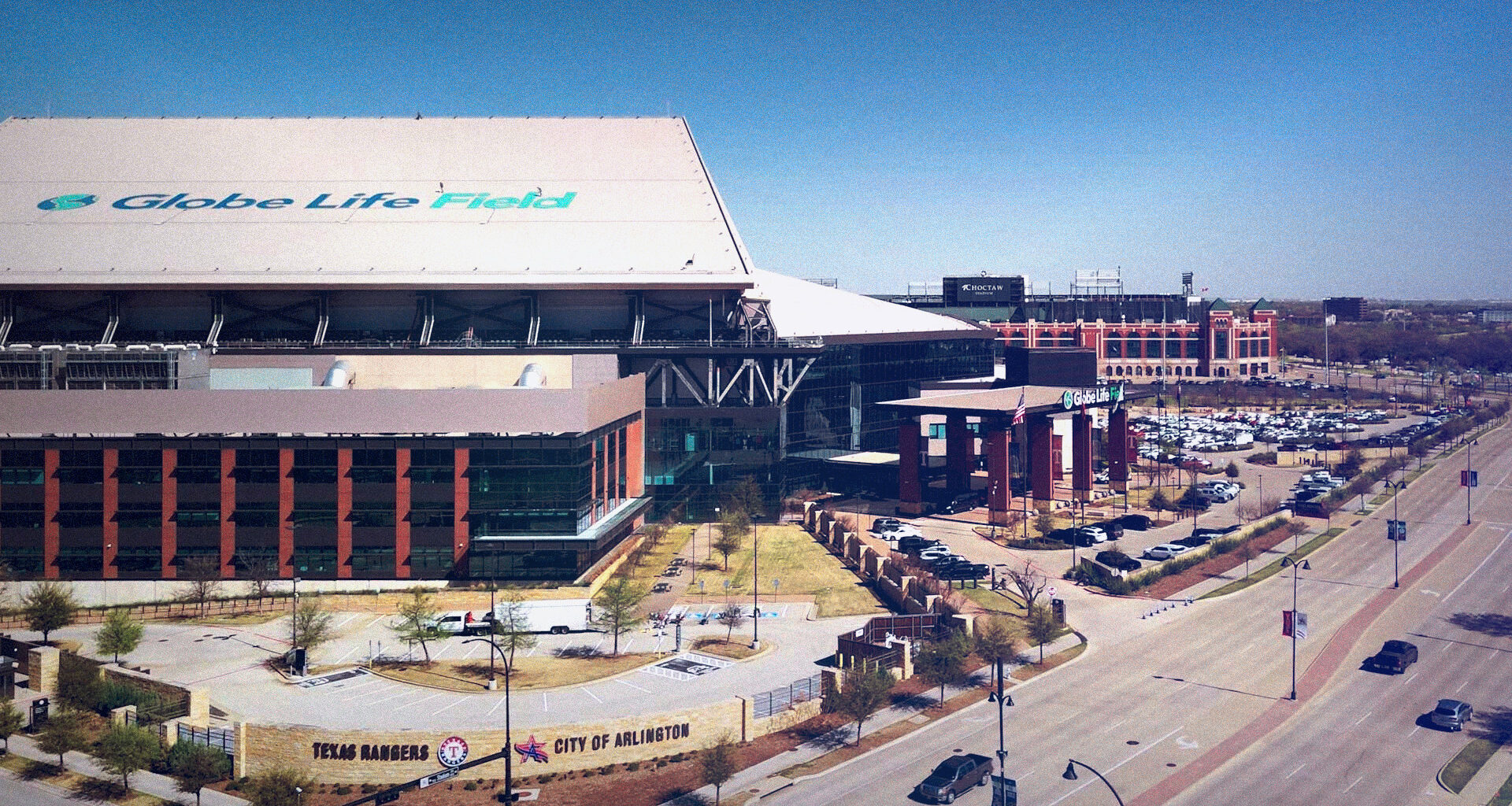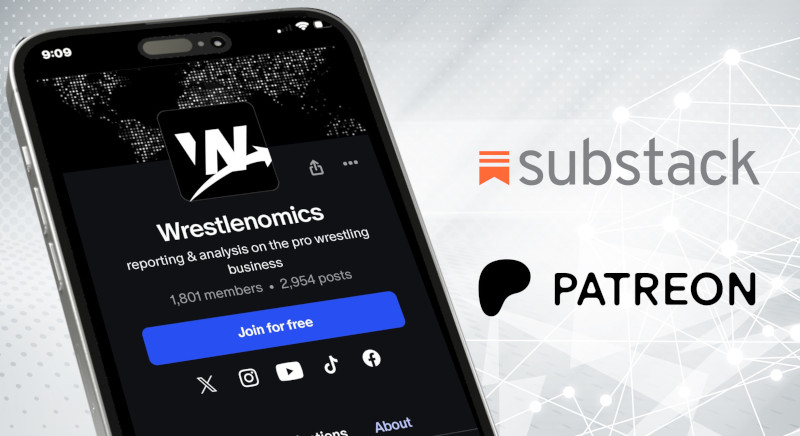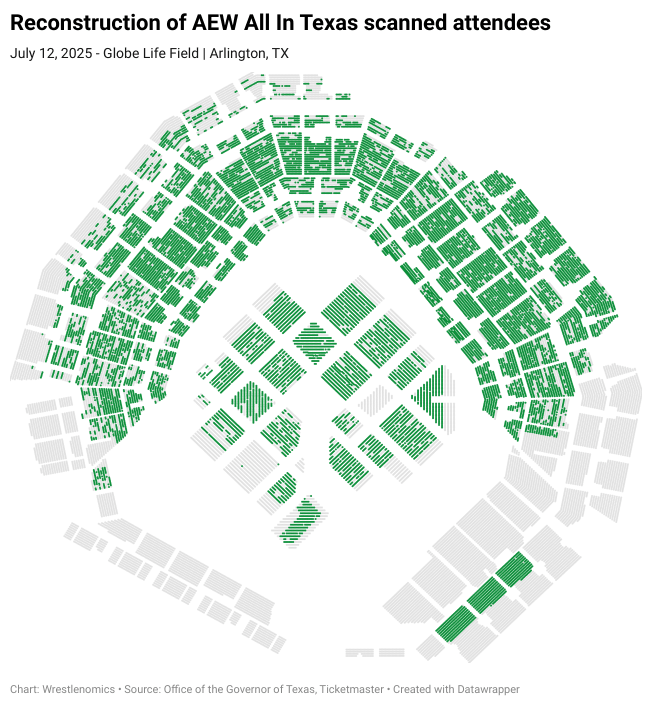This article was also published for Wrestlenomics subscribers. Signup now on
Patreon
or Substack
to unlock access to paywalled and ad-free reporting and analysis on the business of pro wrestling.
AEW All In Texas qualified for public reimbursement dollars through the Texas Event Trust Fund program.
According to records obtained by Wrestlenomics, the governor’s office initially approved just over $1 million in combined state and local funding to help cover expenses for AEW’s biggest event of the year. AEW will end up getting somewhat less than that amount though because attendance for the event at Globe Life Field in Arlington was lower than expected.
The funding approval was based on estimated attendance of 33,490, including 32,500 spectators, projected in February. After the July 12 show, officials submitted documentation certifying actual attendance at 23,759, including 21,973 spectators.
The count of 21,973 spectators reflects the number of tickets scanned for people who actually entered the venue. The number of tickets sold or distributed, which we couldn’t confirm, could differ significantly. The final estimate by WrestleTix of tickets distributed was 27,245. It’s not unusual for the number of tickets scanned to be substantially lower than the number of tickets distributed or sold. Records also show 678 suite tickets were sold though only 274 were scanned for admission.
Because the certified figure is 29% below the estimate submitted five months ahead of All In, the reimbursement amount will be proportionally reduced, Arlington City Manager Trey Yelverton confirmed to Wrestlenomics.
Still, if the funding is reduced by roughly the same 29%, AEW would end up seeing around $700,000 in reimbursements, which are intended to go toward the costs of putting on All In.
The City of Arlington applied for state funding on February 4, and later that month the Office of the Governor’s Economic Development and Tourism Division approved reimbursement funding based on the city’s application and an accompanying economic impact study, which projected spending from out-of-market and out-of-state visitors who would be drawn to the area’s hotels, restaurants, and other businesses. The approved reimbursement of $1,078,340 was largely based on a similar amount of incremental tax revenue anticipated as a result of out-of-town visitors spending in the area.
When anticipated attendance is more than 25% lower than the actual attendance, it triggers a proportional reduction, Yelverton said, speaking to us by phone on Tuesday. That’s consistent with the state law governing the event program, which allows the governor’s office to reduce reimbursements proportionally when actual attendance is “significantly lower” than projected.
Yelverton said he was pleased AEW brought its major event to Arlington and was appreciative of how many people it drew from outside the area. He added that AEW has not received any of the reimbursement funding yet, which is normal. The payment process can take between six and twelve months to finalize, he said.
AEW and the Office of the Governor did not respond to multiple requests for comment for this story.
WWE has also received funding under the state’s event programs, for at least two WrestleManias in Arlington in 2016 and 2022, two Royal Rumble events in San Antonio in 2017 and 2023, and Survivor Series in Houston in 2017. WWE received just over $3 million for the 2016 WrestleMania. The 2022 WrestleMania had an adjustment, too, as WWE ended up receiving $5.2 million after initially being approved for nearly $9 million in funding.
AEW CEO Tony Khan mentioned in the post-show press conference that the attendance at Globe Life Field that night was “I think close to 29,000 when it’s all said and done,” a number closer to the WrestleTix estimate of tickets out of just over 27,000 than the scan count of just under 22,000. In the days leading up to the event Khan said in an interview that the gate had passed $2.5 million and that he expected to surpass $3 million.
The city’s application listed several associated events that were seemingly slated to take place in the Arlington area but were never announced. The July 11 Ring of Honor Supercard of Honor show did happen at Esports Stadium. And the Starrcast convention took place at the Sheraton hotel. But also listed in the application were CMLL and New Japan events, as well as two music events which apparently didn’t make it past planning stages.
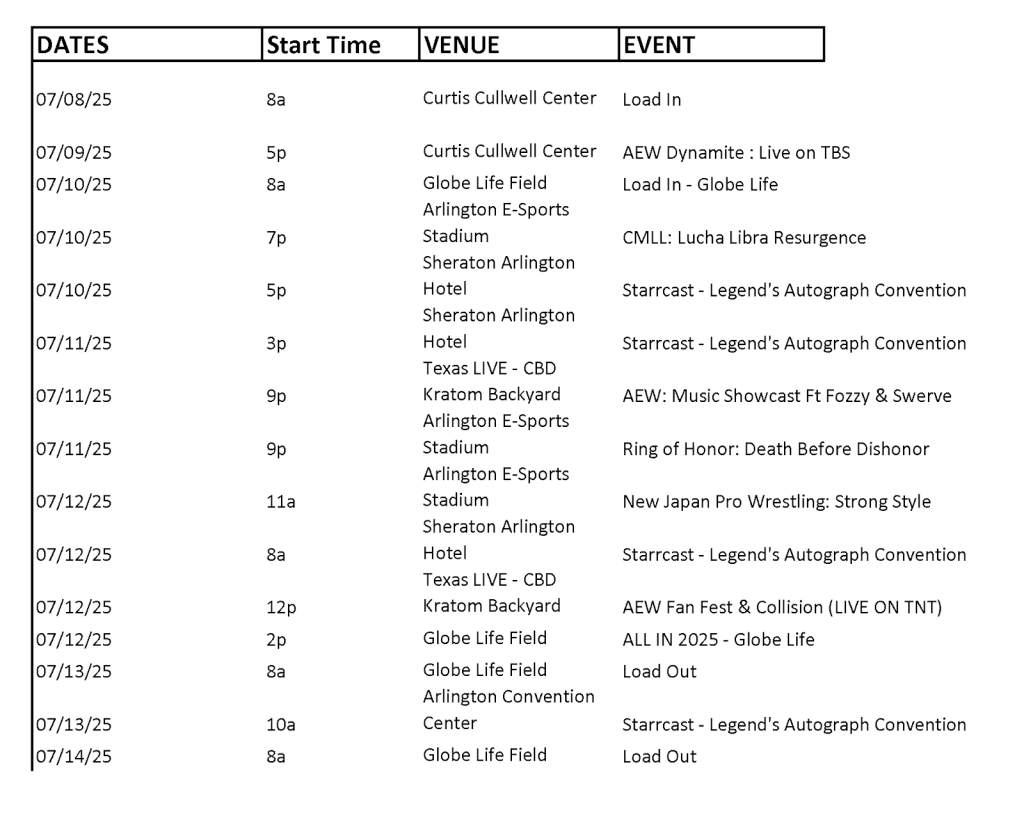 Listing of events included in the application for funding for AEW All In under Texas’s Event Trust Fund program
Listing of events included in the application for funding for AEW All In under Texas’s Event Trust Fund program
The list suggests plans that would’ve had the week of All In further resembling a WrestleMania week. A “Lucha Libra Resurgence” [sic] CMLL show was listed for Esports Stadium on the Thursday evening before All In.
Then, Friday was to include an “AEW: Music Showcast” at CBD Kratom Backyard, a concert venue close to Globe Life Field. The event was to feature Fozzy — Chris Jericho’s band — and “Swerve,” almost certainly referring to Swerve Strickland who’s not only a wrestler but also a rapper.
For Saturday morning, “New Japan Pro Wrestling: Strong Style” was listed for Esports Stadium. Then later in the day, an AEW fan fest and live Collision event at the Backyard were to take place, just before All In. Collision ultimately aired live from the Curtis Culwell Center in Garland, about an hour drive from Arlington, on the Thursday after Dynamite aired live from the same venue the night before.
We couldn’t confirm whether the unannounced events were affected by ticket sales for All In, but alongside the attendance estimate that was ultimately 29% too high, the details suggest expectations may have outpaced demand.
There’s plenty of data, however, to show that thousands of fans travelled to the area to attend All In. Government records indicate at least 6,258 fans came from outside Texas and at least another 4,628 came from elsewhere in Texas but outside the local market. Those figures are almost certainly higher because 5,255 spectators’ residences couldn’t be determined.
The data submitted to certify the attendance and justify the reimbursement funding offers a glimpse into the “travel wrestling fan” phenomenon, showing how far attendees came to see All In.

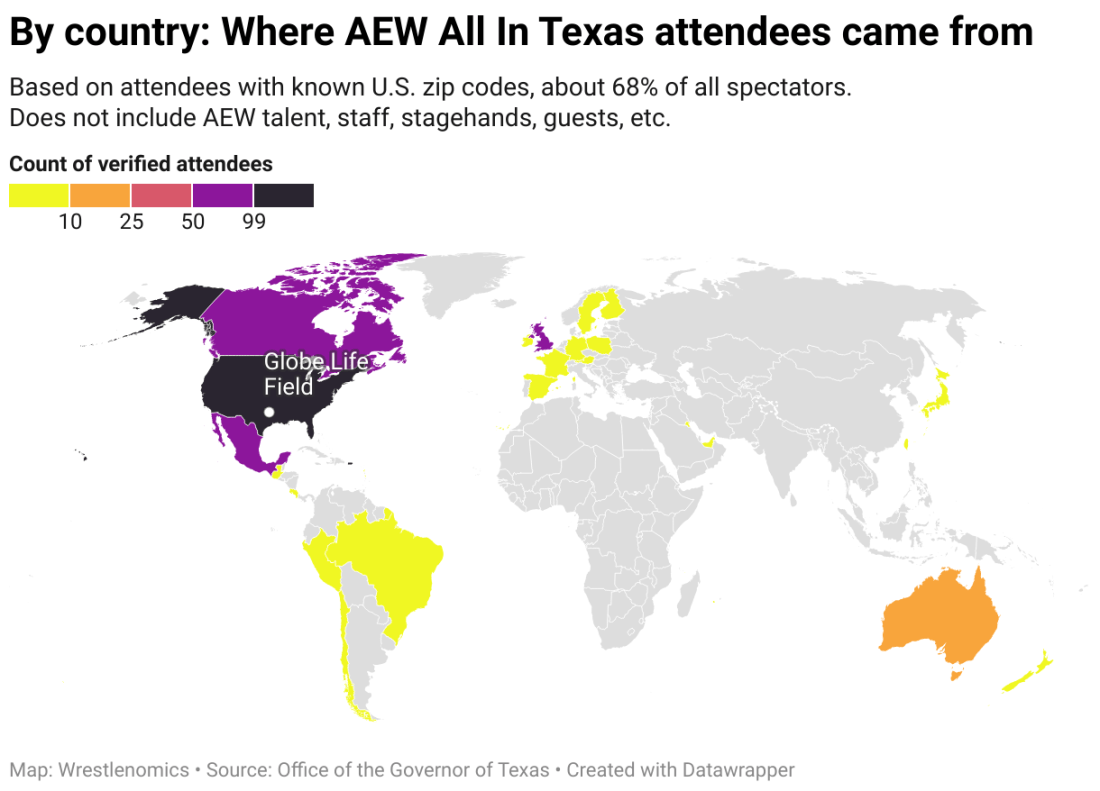
Attendees from 49 of the 50 U.S. states (Wyoming, the least populated state, was left out), Puerto Rico, and Washington D.C., were accounted for. Fans from at least 23 different countries attended. After the U.S., leading countries were Canada, Mexico, the U.K., and Australia.
This isn’t the first time AEW has received government subsidies for events. AEW was projected to receive a $373,388 tax credit related to Double or Nothing 2024 and the accompanying Collision. And the company received a tax credit worth $2,134,560 for events in Ohio.
A contract with the City of Arlington shows that AEW paid $23,000 to rent the city-owned Esports Stadium, where the ROH pay-per-view took place and which the company occupied from Thursday to Saturday. Drafts of the venue agreement show AEW proposed a variety of changes to the contract, which ultimately were not a part of the executed contract.
One draft of the contract shows suggested changes from a member of AEW’s legal team that highlights the company’s efforts to control information. AEW sought to insert provisions that would’ve committed the city to keep secret any attendance information and help AEW make trade secret claims if there was a legal requirement to publicly reveal the numbers.
The suggested confidentiality clause would have the city agree “not to publish or disclose attendance figures, turnstile counts, drop counts, ticket numbers, revenues, box office receipts,” and similar information, except when disclosure would be legally unavoidable. Even then, AEW’s language would’ve bound the city to notify the company in advance and assist in claiming that AEW’s attendance information is a trade secret under Texas law.
Another suggested clause would have sent legal disputes, if there were any, between AEW and the city into private binding arbitration instead of public court. Like with at least some of its talent contracts, AEW wanted its counterparty to waive its right to a jury trial and handle litigation only in private, with AEW’s chosen arbitration provider, JAMS.
Those clauses didn’t make into the final version because, Yelverton told us, agreeing to it wouldn’t have complied with state law. Texas statutes establish limits under which government entities can resolve disputes in arbitration.
“That is not an unusual request we receive,” Yelverton wrote to us by email on Wednesday, “but it is an easy response because it is not allowed under state law.”
The full language of the suggested arbitration clause may give us insight into AEW’s preferred language for these kinds of agreements that aim to keep lawsuits hidden from public view.
ARBITRATION. All disputes between the Parties, including, without limitation, any dispute relating to any matter arising under this Agreement or any dispute concerning the performance, application or interpretation of any provision of this Agreement (including, without limitation, the application of this arbitrability clause to any dispute), shall be resolved for final, binding, and conclusive arbitration conducted before a single arbitrator in Tarrant County, Texas and administered by JAMS, Inc. pursuant to its Comprehensive Arbitration Rules and Procedures. Provided, however, that nothing in this provision is intended to require arbitration of any claims or disputes that cannot be arbitrated or subject to pre-dispute arbitration agreements under controlling federal or state law, including as provided under the Ending Forced Arbitration of Sexual Assault and Sexual Harassment Act. Judgment may be entered on the arbitrator’s award in any court having jurisdiction and the sole grounds on which the arbitrator’s decision may be appealed are those set forth in the Federal Arbitration Act, 9 U.S.C. §10(a). THE PARTIES EACH HEREBY WAIVE, TO THE FULLEST EXTENT PERMITTED BY LAW, ANY RIGHT IT MAY HAVE TO A TRIAL BY JURY IN RESPECT OF ANY SUIT, ACTION OR PROCEEDING DIRECTLY OR INDIRECTLY ARISING OUT OF, UNDER OR IN CONNECTION WITH THIS AGREEMENT.
The suggested clause included a carve out acknowledging that the relatively new Ending Forced Arbitration of Sexual Assault and Sexual Harassment Act prohibits predispute arbitration agreements in cases of sexual misconduct.
Other suggested edits also not part of the executed agreement show AEW sought full control of event-related sponsorships. AEW also wanted to write in a favorable merchandise split, getting 80% of sales, and 90% for certain items, including media, replica belts, masks, and autographed items.
Yelverton said revenue splits were removed because it’s their longstanding business practice at the venue for the city to retain all revenues from concessions they sell.
Yelverton explained they do, though, allow leaseholders like AEW to retain all revenues from ticket sales and concessions that they sell, like merchandise.
“We do sometimes receive similar requests, but our practice effectively predetermines the revenue split so that the event and city facility both have opportunities to capture event revenue,” he added.
As we reported previously, emails between AEW staff and City of Arlington personnel obtained through our public records requests indicate AEW is loosely scheduled for a residency at Esports Stadium, possibly overlapping January and February 2026.
Brandon Thurston has written about wrestling business since 2015. He operates and owns Wrestlenomics.
This article was possible because of support from our subscribers.
Related

